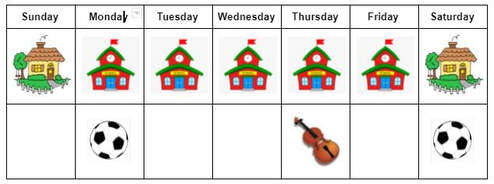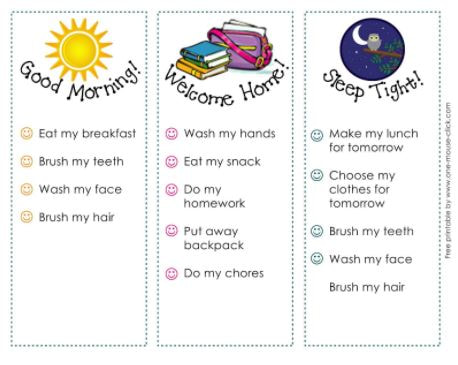|
By Beth Cieslak, PLPC
New schedules and routines can be exciting, but also come with a variety of mixed emotions for all ages. We may be excited about a new opportunity, but also unsure and anxious about the unknown aspects. As adults, we utilize calendars, phone reminders, and sticky notes to keep track of the many things going on in our lives. Kids and teens also benefit from these supportive strategies. Visual schedules consisting of pictures and/or simple words are effective tools to meet this need. Visual schedules help to increase confidence and minimize anxiety. Compliance resistance, power struggles, and prompt dependency may also decrease with the use of visual supports. Sheri Klugmann, Ramapo for Children Senior Parent Educator, explained that visuals help children to:
Including children and teens in the planning and preparation of visual schedules builds ownership of ideas and promotes success. What aspects of the day/week are creating the most stress or uncertainty? Would you like to write or draw pictures to illustrate? Can we take photos of the places in our routine, such as home, school, activities? Tech savvy families may enjoy creating visuals utilizing online image searches. Accessibility to these visual supports is essential. Post visual schedules where they are easily seen, such as on the refrigerator or bedroom wall. Place an additional schedule inside their backpack for access away from home. Teens may prefer to create and access visual schedules on technology devices such as a cell phone. Next comes teaching and practicing use of the visual schedule. Assist the child/teen in referring to the schedule for information. Some visuals will require identification of the place they are at on the schedule. Small binder clips or clothespins work well for pointing to a specific area. Another idea is to mark off completed tasks or days in the schedule. Here are some examples of visual schedules to get you started. I wish you and your family the very best as we embark on the new school year! Beth Cieslak, PLPC is under the clinical supervision of Pam Lueders, LPC (MO#2015026733)
0 Comments
|
Archives
August 2021
Categories
All
|



 RSS Feed
RSS Feed